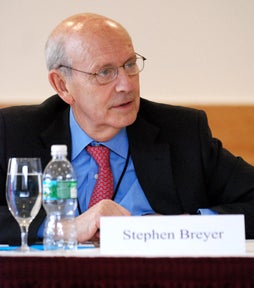How should judges interpret ambiguous statutes?
Fourteen leading legal scholars—including U.S. Supreme Court Justice Stephen Breyer ’64—took up that question in a conference at HLS yesterday, occasioned by the publication of a new book, ” Statutory Default Rules: How to Interpret Unclear Legislation” (Harvard University Press, 2008) by Professor Einer Elhauge ’86.
In the book, Elhauge offers a fresh approach to interpretive challenges: judges should rely on statutory “default rules,” he writes, that are designed to maximize the satisfaction of “enactable political preferences,” or preferences shared by enough legislators that they would be passed into law if they were up for vote. The book drew praise from the conference attendees, who debated some of its nuances.
Breyer offered a summary of the approach to interpretation that he has taken in his nearly three decades as a judge. “What do I think I’m doing? I’m applying the law. Period,” said Breyer. But when the law isn’t clear, he said, judges generally have six tools for interpreting ambiguous language: the text itself, the history of the text, tradition around the issue, precedent, the purpose of the statute, and the consequential values that lie behind that purpose. “If you say, ‘Of those, which is most useful?’ I’d say, the legislature’s purpose and intent,” Breyer said. “What if I can’t figure that out because they didn’t tell me? I can always figure it out—that’s [my] job.”
In working through that question, said Breyer, he asks himself, “What would a reasonable legislator have wanted, given … given what? Given a lot. That’s what I think I’m doing. Is there a better way to do it? Undoubtedly. I just don’t know what it is.”
In addition to Elhauge and Justice Breyer, attendees of the afternoon conference included: Dean Elena Kagan ’86; HLS Professors Richard Fallon, John Manning ’85, Adrian Vermeule ’93 and Matthew Stephenson ’03; Yale Law Professors Ian Ayres, Peter Schuck ’65 and Jerry Mashaw; Columbia Law School Professor Thomas W. Merrill (currently the Roscoe Pound Visiting Professor of Law at HLS); Professor Kenneth Shepsle of Harvard University’s Department of Government; Professor Emerson H. Tiller of Northwestern University School of Law; and Professor Sam Issacharoff of New York University School of Law. Said Elhauge: “I was honored to have the finest legal minds in the field analyze my theory of statutory interpretation, grateful—and more than a bit surprised—about their remarkable words of praise, and I learned tremendously from their incisive questions. It was the intellectual highlight of my life.” Breyer, explaining why he had been eager to attend, said: “I’m interested in the subject and there are a lot of very good experts here, so I can learn something.”
